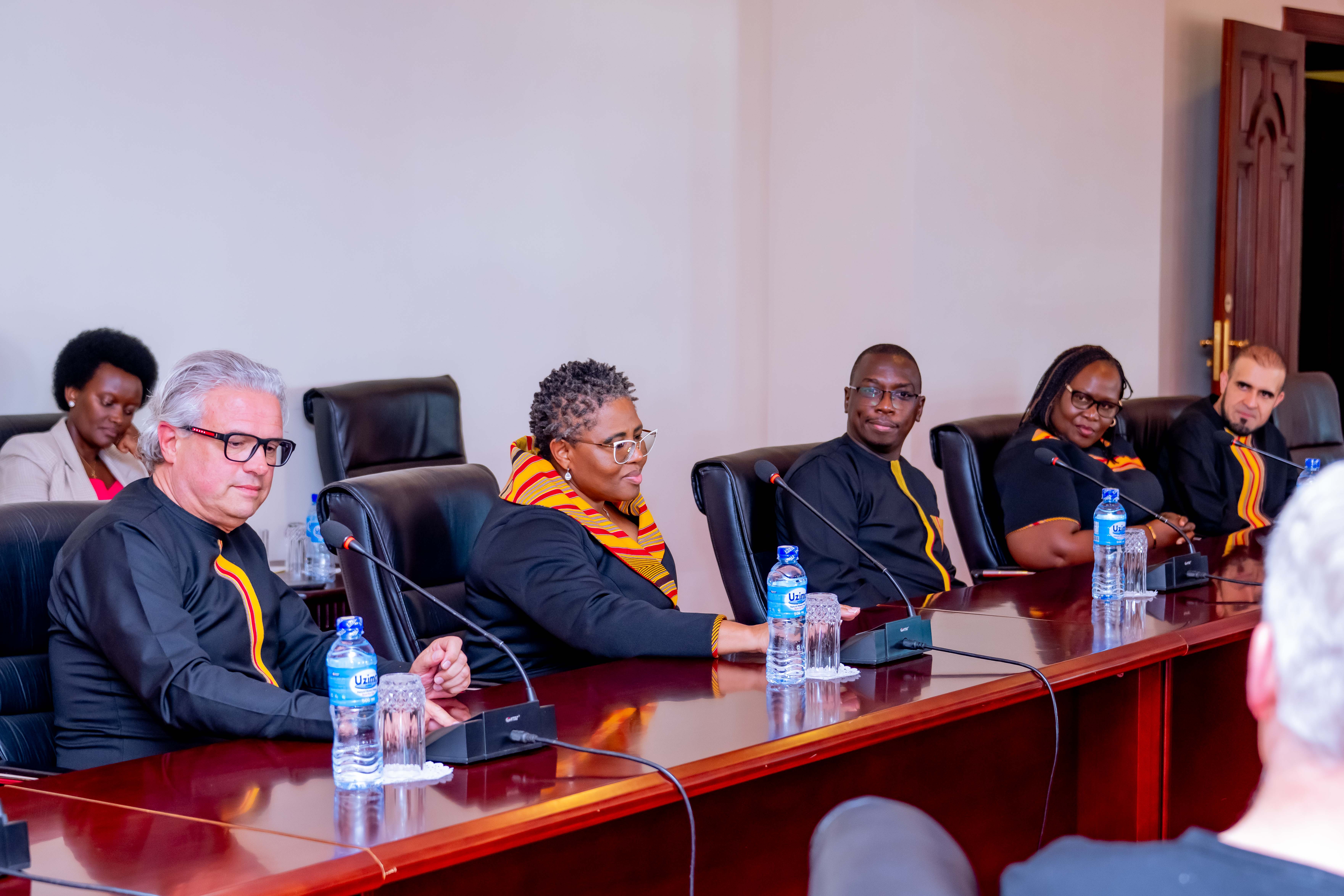Museveni meets MTN top officials, calls for broader investment
During the talks, President Museveni expressed satisfaction with MTN’s growth in Uganda since its inception, a release from the Presidential Press Unit revealed.
During the meeting that took place at State House, Entebbe on Friday, Museveni's guests were led by Jonas Mcebisi, the Chairman of the MTN Group. (Credit: PPU)
By Admin .
Journalists @New Vision
KAMPALA - President Yoweri Kaguta Museveni has held discussions with a delegation from MTN Group.
During the meeting that took place at State House, Entebbe on Friday, Museveni's guests were led by Jonas Mcebisi, the Chairman of the MTN Group.
MTN Group is a South African multinational corporation and mobile telecommunications provider. The group is among the largest mobile network operators in the world.
During the talks, President Museveni expressed satisfaction with MTN’s growth in Uganda since its inception, a release from the Presidential Press Unit revealed.
“I am glad that MTN has grown. I remember when it had just started, Mzee Mandela (former SA President Nelson Mandela) called me on a small phone. I do not remember who brought it, but that was the beginning,” the President recalled.
According to the PPU release, Museveni emphasised the importance of investing in sectors that generate jobs and raise incomes, noting that income growth directly boosts demand for communication services.
“If people have jobs and incomes, they will buy more phones and use them more. That’s why we must invest in the four key sectors of wealth and job creation: commercial agriculture, manufacturing, services, and ICT. The purchasing power per capita in Africa is still low, and to raise it, we must expand our economic base, not just operate in a narrow business sector,” he said.
President Museveni also stressed the importance of cross-border investment to enhance regional integration and economic growth.
“You should discuss and see how you can intensify cross-border investment. That’s how we can strengthen intra-African trade and cooperation,” he urged.
The
President encouraged MTN and other investors to explore manufacturing partnerships and take advantage of Africa’s emerging opportunities in regional trade and industrialization.
Reflecting on Uganda’s economic transformation journey, President Museveni pointed out that one of the biggest challenges has been moving citizens from subsistence to the money economy.

“By 1962, when the British left, only 4% of Ugandans were in the money economy. The rest lived in villages, surviving on what nature provided. By 2013, only 32% of households were in the money economy. We had to involve the army to go and sensitise people. By 2021, we had reached 64%, and now only 33% remain outside,” he noted.
President Museveni also highlighted the role of increased coffee production and milk output as evidence that rural transformation is underway.
“Coffee is now bringing in about nine million bags annually, and people are beginning to taste the benefits of being in the money economy,” he said.
The President further addressed the issue of property fragmentation following inheritance, which he described as a barrier to sustained wealth creation.
He encouraged Ugandans to learn from capitalist models of managing shared assets through mechanisms like company shares.
“In some parts of the world, families have found ways to share ownership while keeping property intact. That’s another struggle we must win here,” he added.
In a historical reflection, President Museveni contrasted Uganda’s development path with that of South Africa, noting that Uganda’s relatively easy climate and dual rainy seasons created different socio-economic conditions.

“In South Africa, many Africans were already involved in agriculture, but here in Uganda, life was so easy that people remained in subsistence farming. That’s the unique challenge we’re dealing with,” he noted.
On behalf of his team, Mr. Jonas Mcebisi, the Chairman of the MTN Group, reaffirmed the company’s long-term commitment to Uganda and praised the excellent cooperation the company has received from the government and regulatory bodies.
Today we came here to say thank you very much for the support you have always given us. We have had excellent collaboration from the regulators, and MTN is not here for the short term; we are here for the long haul,” he said.
Mcebisi further expressed interest in strengthening Uganda-South Africa business linkages.
“We believe there is real opportunity to help Ugandan businesses enter the South African market, and that is something we can explore further,” he noted.

He also provided an update on MTN’s footprint in Uganda and globally.
“We currently have about 22 million customers in Uganda, with approximately 12 million of them using real smartphones. Globally, MTN serves over 297 million customers, which gives us a broad network and capacity to support development,” he added.
Dignitaries at the meeting included Joyce Nabbosa Ssebugwawo, the Minister of State for ICT and National Guidance, Ramathan Ggoobi, the Permanent Secretary and Secretary to the Treasury (PSST), Ministry of Finance, Planning and Economic Development, John Musinguzi, the Commissioner General of Uganda Revenue Authority (URA), and George William Nyombi Thembo, the Executive Director of Uganda Communications Commission (UCC).